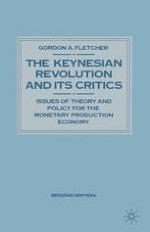1989 | OriginalPaper | Buchkapitel
Money, Investment and Saving
verfasst von : Gordon A. Fletcher
Erschienen in: The Keynesian Revolution and its Critics
Verlag: Palgrave Macmillan UK
Enthalten in: Professional Book Archive
Aktivieren Sie unsere intelligente Suche, um passende Fachinhalte oder Patente zu finden.
Wählen Sie Textabschnitte aus um mit Künstlicher Intelligenz passenden Patente zu finden. powered by
Markieren Sie Textabschnitte, um KI-gestützt weitere passende Inhalte zu finden. powered by
The distinction between the uncertainty world of reality and the purely theoretical world of perfect knowledge is the real meaning behind J. M. Keynes’s proposition that a monetary economy is different from a barter economy. It is a distinction fundamental to his whole approach and central to his assault on ‘classical’ macroeconomics. The ‘monetary economy’ is the real, money-using world of uncertainty. The ‘barter economy’ is the purely abstract world of classical theory in which perfect information ensures that money has no substantive form, so that exchange is in effect direct and the economy is of barter-type. Keynes argued that:
The whole object of the accumulation of Wealth is to produce results, or potential results, at a comparatively distant, and sometimes at an
indefinitely
distant, date. Thus the fact that our knowledge of the future is fluctuating, vague and uncertain, renders Wealth a peculiarly unsuitable subject for the methods of classical economic theory.
1
